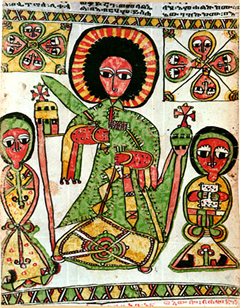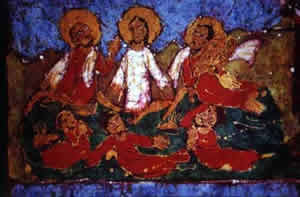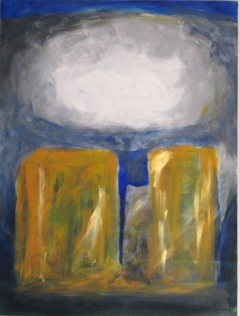If Asked, Don't Tell:
Secrecy and Jesus
For Sunday March 2, 2014
Lectionary Readings (Revised Common Lectionary, Year A)
Exodus 24:12–18
Exodus 24:12–18
12 The Lord said to Moses, “Come up to me on the mountain and stay here, and I will give you the tablets of stone with the law and commandments I have written for their instruction.”
13 Then Moses set out with Joshua his aide, and Moses went up on the mountain of God.
14 He said to the elders, “Wait here for us until we come back to you. Aaron and Hur are with you, and anyone involved in a dispute can go to them.”
15 When Moses went up on the mountain, the cloud covered it,
16 and the glory of the Lord settled on Mount Sinai. For six days the cloud covered the mountain, and on the seventh day the Lord called to Moses from within the cloud.
17 To the Israelites the glory of the Lord looked like a consuming fire on top of the mountain.
18 Then Moses entered the cloud as he went on up the mountain. And he stayed on the mountain forty days and forty nights.
Psalm 2 or
Psalm 2
1 Why do the nations conspire
and the peoples plot in vain?
2 The kings of the earth rise up
and the rulers band together
against the Lord and against his anointed, saying,
3 “Let us break their chains
and throw off their shackles.”
4 The One enthroned in heaven laughs;
the Lord scoffs at them.
5 He rebukes them in his anger
and terrifies them in his wrath, saying,
6 “I have installed my king
on Zion, my holy mountain.”
7 I will proclaim the Lord’s decree: He said to me, “You are my son;
today I have become your father.
8 Ask me,
and I will make the nations your inheritance,
the ends of the earth your possession.
9 You will break them with a rod of iron[b];
you will dash them to pieces like pottery.”
10 Therefore, you kings, be wise;
be warned, you rulers of the earth.
11 Serve the Lord with fear
and celebrate his rule with trembling.
12 Kiss his son, or he will be angry
and your way will lead to your destruction,
for his wrath can flare up in a moment.
Blessed are all who take refuge in him.
Psalm 99
Psalm 99
1 The Lord reigns,
let the nations tremble;
he sits enthroned between the cherubim,
let the earth shake.
2 Great is the Lord in Zion;
he is exalted over all the nations.
3 Let them praise your great and awesome name—
he is holy.
4 The King is mighty, he loves justice—
you have established equity;
in Jacob you have done
what is just and right.
5 Exalt the Lord our God
and worship at his footstool;
he is holy.
6 Moses and Aaron were among his priests,
Samuel was among those who called on his name;
they called on the Lord
and he answered them.
7 He spoke to them from the pillar of cloud;
they kept his statutes and the decrees he gave them.
8 Lord our God,
you answered them;
you were to Israel a forgiving God,
though you punished their misdeeds.
9 Exalt the Lord our God
and worship at his holy mountain,
for the Lord our God is holy.
2 Peter 1:16–21
2 Peter 1:16–21
16 For we did not follow cleverly devised stories when we told you about the coming of our Lord Jesus Christ in power, but we were eyewitnesses of his majesty.
17 He received honor and glory from God the Father when the voice came to him from the Majestic Glory, saying, “This is my Son, whom I love; with him I am well pleased.”
18 We ourselves heard this voice that came from heaven when we were with him on the sacred mountain.
19 We also have the prophetic message as something completely reliable, and you will do well to pay attention to it, as to a light shining in a dark place, until the day dawns and the morning star rises in your hearts.
20 Above all, you must understand that no prophecy of Scripture came about by the prophet’s own interpretation of things.
21 For prophecy never had its origin in the human will, but prophets, though human, spoke from God as they were carried along by the Holy Spirit.
Matthew 17:1–9
Matthew 17:1–9
1 After six days Jesus took with him Peter, James and John the brother of James, and led them up a high mountain by themselves.
2 There he was transfigured before them. His face shone like the sun, and his clothes became as white as the light.
3 Just then there appeared before them Moses and Elijah, talking with Jesus.
4 Peter said to Jesus, “Lord, it is good for us to be here. If you wish, I will put up three shelters—one for you, one for Moses and one for Elijah.”
5 While he was still speaking, a bright cloud covered them, and a voice from the cloud said, “This is my Son, whom I love; with him I am well pleased. Listen to him!”
6 When the disciples heard this, they fell facedown to the ground, terrified. 7 But Jesus came and touched them. “Get up,” he said. “Don’t be afraid.” 8 When they looked up, they saw no one except Jesus.
9 As they were coming down the mountain, Jesus instructed them, “Don’t tell anyone what you have seen, until the Son of Man has been raised from the dead.”
This Sunday is the last week in the season of Epiphany. The following week we begin forty days of Lent with Ash Wednesday.
The word "epiphany" means disclosure, manifestation, unveiling or appearance. So, how fitting that Matthew 17 for this week describes one of the greatest "epiphanies" ever — the Transfiguration of Jesus, complete with blinding light, a heavenly voice, and visions of Moses and Elijah.
But how strange that this disclosure concludes in all three synoptics with a command of secrecy. "Don't tell anyone what you have seen," Jesus told his disciples after the Transfiguration.
 |
Ethiopian depiction of the Transfiguration. |
Back in 1901, the German Lutheran scholar Georg Friedrich Eduard William Wrede published a book called The Messianic Secret that explored a motif that's present in all four gospels, and conspicuously prominent in Mark. The phrase stuck, and ever since then "messianic secret" has been scholarly shorthand for a mysterious phenomenon in the gospels.
Depending on how you count them, about 15 different times in the gospels Jesus explicitly suppresses knowledge about his identity. There are at least 13 occurrences in Mark alone. Jesus conceals knowledge about himself in several different ways.
Several times he silenced the evil spirits that he exorcised: "he would not let the demons speak because they knew who he was."
He ordered his own disciples to keep silent about what they had experienced — after Peter's confession of Christ as Messiah, and after the Transfiguration.
Jesus also told some of the people he had healed to keep silent: "Jesus sent him away with a strong warning: 'See to it that you don't tell this to anyone.'"
In private discussions away from the crowds, Jesus told his disciples that he "explained everything" about the "secret of the kingdom" to them, whereas those on the "outside" got only obfuscating parables. And those parables, we read in another place, both reveal and hide truth at the same time.
When he traveled, sometimes Jesus "did not want anyone to know where they were." In John 7, for example, he went to the Feast of Tabernacles "in secret" in order to hide his identity.
In the beatitudes of Matthew 6, Jesus taught us to give, to pray, and to fast, all "in secret." God the Father, he says, will "see what is done in secret."
There are also broader corollaries to these specific examples. Until he burst onto the public scene for three years of ministry, Jesus lived for thirty years in total obscurity — a secret life about which we know nothing at all.
 |
The Transfiguration, batiq by Solomon Raj, India. |
Paul told the Corinthians, the Ephesians, and the Colossians that the gospel was a secret or mystery that had been revealed.
The earliest Christians who worshipped in the catacombs of Rome were criticized by pagans for their secret meetings and bizarre rituals, rumored to include cannibalism, incest, and infanticide. They were people of the periphery — antisocial, avoiding the theater and the games, and apolitical, refusing to run for office. The Christians, griped the critic Caecilius, "do not understand their civic duty."
There was at least some justification for the charge of secrecy — early baptismal instruction lasted many months, during which time the full gospel was deliberately kept secret from the baptismal candidates.
Why all this secrecy? What does it mean, in its original context and for us today?
Ever since Wrede, scholars have debated every aspect of the "secrecy motif." Some people even think it's an overeading or much ado about nothing.
It might have been a political strategy by Jesus to avoid unwanted attention from the Roman authorities. There's also a sense that he was "biding his time" and that he didn't want any premature ending to his mission. But neither of these explains why secrecy is such a prominent literary theme in Mark.
A few years ago I read a book by Jonathan Malesic called Secret Faith in the Public Square; An Argument for the Concealment of Christian Identity (2009). The title sounds crazy (which is one reason it attracted me), until you consider the breadth and depth of the secrecy motif in the gospels.
Malesic commends a simple theme from Scripture: "Beware of practicing your piety before others in order to be seen by them. . . But whenever you pray, go into your room and shut the door and pray to your Father who is in secret; and your Father who sees in secret will reward you" (Matthew 6:1, 6).
He laments the enormous damage done to the faith by its putative "success" in society. For many American believers, faith is a form of currency (political, economic, social) by which they accrue personal benefits. Think of a politician who makes sure that voters know that he attends church.
Malesic's response to this problem is counter intuitive. He tries to show how deliberate secrecy about one's faith "is a real though under emphasized theme in Christian theological, liturgical, and spiritual tradition." To save our faith we must veil it from others.
 |
The Transfiguration by Mimi Ess. |
He has in mind Christianity in America, and especially the "bourgeoisie" and "cosmopolitan evangelicals" who enjoy and strive for social privileges by wearing faith on their sleeves. Only by a return to secrecy, by which Malesic means "intentional concealment of knowledge from another person," can American Christianity be saved from its opportunistic impulse to exploit the gospel for social gain.
Malesic devotes two chapters each to three Christians who commend Christian secrecy. Cyril of Jerusalem's catechetical practices withheld knowledge of the sacraments until after baptism. Kierkegaard's book Works of Love argues that genuinely selfless acts must be hidden in order to avoid the quid pro quo of praise. And Dietrich Bonhoeffer wrote that "the Christian cause will be a silent and hidden affair."
So, says Malesic, concealing one's Christian identity is "not an isolated tradition."
His book reminded me of the poem by Emily Dickinson (1830–1886) called Tell it Slant:
Tell all the Truth but tell it slant —
Success in Circuit lies;
Too bright for mind's infirm intent,
The Truth's superb surprise.As Lightning to the Children eased,
With explanation kind;
The Truth must dazzle gradually,
Or every man be blind.
When I mentioned Malesic's book to a church leader who speaks all around the country, he scoffed. I should have known better. But in our world of Total Information and Hype, I think Malesic might be on to something.
Footnote: For the 13 references to secrecy in Mark: 1:21-28, 29-34, 40-45;3:7-12; 4:10-12, 33-34; 5:21-43; 7:31-37; 8:22-26, 27-30; 9:2-13, 30-32; and 13:3-4.
Image credits: (1) Matt Stone; (2) AsianChristianArt.org; and (3) MimiEss.com.





